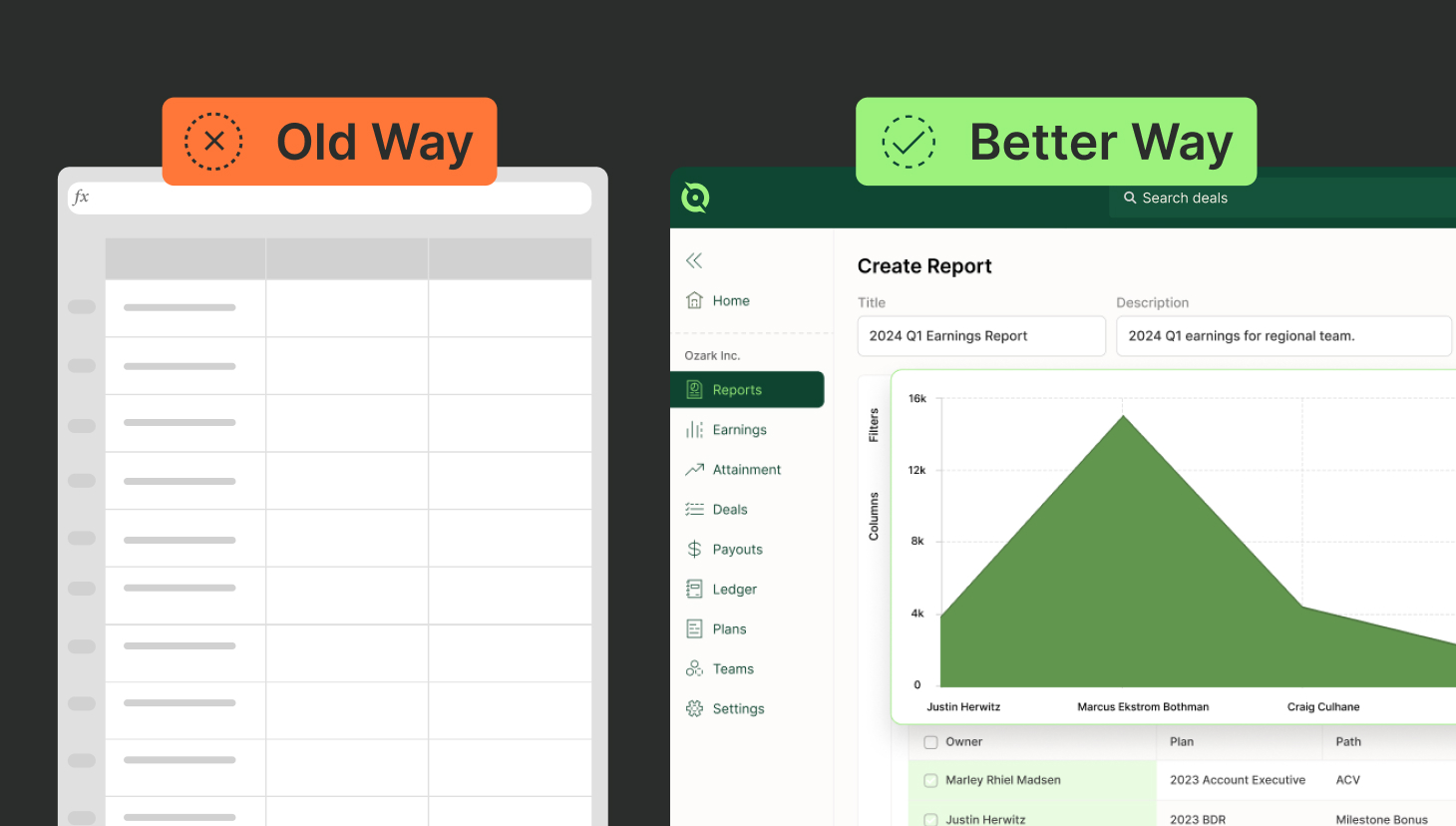A well-designed and executed sales compensation plan is essential to company success. It is intended to communicate expectations and motivate sales behaviors that drive business goal achievement. If the comp plan is confusing, sales reps won’t understand how they earn commissions and will not effectively prioritize sales activities that drive the desired results.
Every leader we surveyed for our report cited at least one issue during the design process, and 30% identified “maintaining simplicity” as the most challenging setback. Our survey also revealed a pattern of overcomplicated plans.
2024 Compensation Trends Report
Our most recent survey, Solving the Biggest Sales Compensation Challenges, evaluated today’s biggest issues with sales compensation design, management, and execution.
Read ReportDon’t worry; we’re here to help simplify your comp plans and boost their effectiveness.
This blog will review the pitfalls of overcomplicated plans, aligning objectives/metrics with comp plans, streamlining, communicating, reviewing adjustments, Sales and Finance collaboration, and plan feedback.
Understanding the pitfalls of overcomplication
Complex sales compensation plans often lead to setbacks.
Our revenue leaders surveyed said overly complicated plans are harder to execute (18%) and too complicated to understand (17%). They also indicated that “simplifying it” (22%) was the most needed improvement in sales compensation management.
Plus, 19% of participants reported that their comp plan doesn’t motivate reps. So, it’s unsurprising that 60% of reps take 3 to 6 months to understand how they are paid.
The solution? Simplifying sales comp plans.
For example, EverView had 35 comp plans, some of which had as many as 12 components.
When EverView leaders surveyed their sales team, they found that 50% of their reps didn’t understand how they earned commissions. So, under the guidance of the QuotaPath team, they simplified and consolidated them into 8 plans.
This newfound clarity motivated their sellers so much that 70% of the team hit quota, and an additional 20% met 90% of the quota.
It’s amazing how motivating a comp plan can be when your reps understand it.
Need help with comp plan design?
Connect with our team for a compensation plan consultation to review your existing structures and identify areas of opportunity.
Book TimeClarity in objectives and key metrics
Survey participants identified maintaining plan alignment with business goals as the biggest challenge in sales compensation management. It’s essential to clearly define objectives and identify metrics that align with them so the plan motivates behaviors that drive business goals.
“You have to eliminate any disconnect between the business’s performance and your team’s performance,” said QuotaPath VP of RevOps Ryan Milligan.
Focusing on metrics aligned with business objectives and creating comp plans based on those metrics helps your business drive profitability, growth, and seller satisfaction.
This is a win-win where reps are rewarded for sales actions while the business achieves its goals.
Streamlining commission structures
Although simplifying tiered commission structures makes them easier to understand, you must ensure they motivate your sales reps. A great way to achieve this is by limiting each plan to three components, like an accelerator, a standard commission rate, and a bonus.
Then, evaluate the balance between simplicity and competitiveness. Make sure that your plan is well aligned with industry and market trends. Otherwise, you could encounter difficulties recruiting and retaining top talent, especially in a competitive hiring market.
EverView illustrates successful streamlining commission models. QuotaPath partnered with them to get their plans down from 35 to 8 and then to 1. As a result, they had their best sales year immediately after simplifying their comp plans, with 70% of the team hitting quota.
Transparent and understandable communication
Clear communication is essential when introducing a new or adjusted sales compensation plan. You don’t want sales reps to experience an unpleasant surprise when their commission check differs from what they expected after pushing for that big deal based on the previous plan.
Failure to share plan changes with sellers before launching a new commission plan leaves reps feeling blindsided, disappointed, and suspicious. This can even cause some reps to quit over miscommunication of comp plans.

That’s why you must create a compensation communication plan when designing a new commission plan. This is where you plan to clearly explain the plan, what has changed, and why, and answer questions about the plan. Then, confirm that everyone understands how they earn commissions by completing a plan verification process. This step creates alignment and transparency across the comp planning process.
Tips for effective communication to avoid misunderstandings include:
- Use consistent messaging each time you share the plan to avoid confusion.
- Employ various methods to communicate the new plan because everyone learns differently.
- Start broad and become more detailed each time the plan is shared and in increasingly smaller audiences, such as the entire sales team vs individually 1:1.
- Create a Frequently Asked Questions (FAQs) document.
- Include calculation examples based on various scenarios within the plan documents.
- Explain why the plan is changing.
- Share the benefits of the new plan.
- Plan documents should be sufficiently long to provide details without being overly lengthy.
- Avoid using legalese and technical or confusing jargon in the plan document.
- Clearly define how performance ties to incentives.
Regular reviews and adjustments
Your work doesn’t end there once you have a simple, logical, and fair compensation plan.
As the market changes, your business goals also change, calling for your team to revisit and adjust your compensation plans accordingly. This way, your plans continue to motivate your reps and drive business goals. Otherwise, you could fall behind quickly and incentivize behaviors misaligned to the changing goals.
What should you look for when you assess your comp plan’s success?
Here are some best practices for continuous improvement and adaptability:
- Make sure your compensation plans are aligned with your most important business metrics.
- Check to see if you’re on target to hit the current quarter’s targets and what percentage of your team has or is on pace to finish the quarter at goal.
- Look at the difference between earnings and attainment of your lowest-performing rep and your highest.
- Make sure you aren’t paying commissions when your team isn’t hitting targets.
- Gather rep feedback to see how they feel about the current plan.

How Sales and Finance can work better together this comp plan season
Learn what preemptive steps you can take before inviting Finance into your compensation plan discussions and how to have productive and aligned conversations.
Read BlogCollaboration between sales and finance teams
Sales and Finance should work together throughout the sales comp design and implementation process to ensure rep confidence in the program. Collaborating early and often aligns Sales and Finance to ensure plan simplicity and accuracy, increasing its effectiveness.
For example, our VP of Finance, Ryan Macia, and Senior Financial Analyst Jonathan Mann are excellent examples of how Finance and Sales can partner throughout the sales compensation design and implementation process.
Ryan and Jonathan both suggest that Sales engage with Finance after creating a plan proposal.
“I prefer when Sales comes to us with options and pre-proposals,” Ryan said. “I don’t like starting from scratch. If you can come to me with some concepts that will motivate the team, we can determine if it will break the bottom line.”
Employee feedback and involvement
Another way that Sales and Finance work collaboratively on the comp plan design is for Sales to gather feedback from quota-carrying team members. Soliciting feedback from sales representatives during the process helps you understand what actually motivates them, what they’ve liked in previous plans, and what they would’ve changed.
Involving sales teams in the process by requesting their input enhances plan acceptance when it is implemented. This also builds a culture of openness and responsiveness to feedback that creates trust.
Achieve sales compensation plan simplicity
The most challenging issue leaders have when creating comp plans is maintaining simplicity. You can employ several key strategies to resist overcomplicating sales compensation plans.
Doing things like getting clear on your business objectives and metrics, simplifying tiered commission structures, and communicating the new plan are a good start.
Then, remember to conduct regular reviews to assess plan performance, encourage Sales and Finance collaboration during the design and implementation process, and gather feedback from quota-carrying reps.
Taking these steps helps you achieve sales compensation plan simplicity and clarity and drives sales team success. It might also be worth exploring automating the process to deliver visibility and insights into your compensation plans’ performance and test and measure plan changes — schedule time with our team to learn more.



